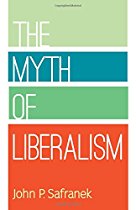The Myth of Liberalism
by James V Schall, The Imaginative Conservative:
The Myth of Liberalism offers a concise argument of the adequacy of modern liberalism and a re-presention of how classical/medieval understanding of family and virtue really is a superior understanding of the human good…
“Contemporary liberalism is less a political philosophy than a façade for undermining extant social and legal mores.” —John Safranek, The Myth of Liberalism, 2015
 When I first looked into this insightful book of John Safranek titled The Myth of Liberalism, I was struck by the introductory sentence that he cites from Hegel’s Philosophy of Right. It is indeed one of those short, pithy statements that tells us, in a few words, what the book is about. In reflecting back over these lines, we realize that what is laid down for our consideration is the basis for the truth of what is proposed. It does explain what our contemporaries are systematically determined to impose on our private and public lives. The book explains how, in their own minds at least, contemporary scholars and jurists justify what they relentlessly promote. Yet, what they present and argue—this is the book’s value—cannot really be valid. The book goes into great detail to explain why no settled proof of liberal propositions is ever found.
When I first looked into this insightful book of John Safranek titled The Myth of Liberalism, I was struck by the introductory sentence that he cites from Hegel’s Philosophy of Right. It is indeed one of those short, pithy statements that tells us, in a few words, what the book is about. In reflecting back over these lines, we realize that what is laid down for our consideration is the basis for the truth of what is proposed. It does explain what our contemporaries are systematically determined to impose on our private and public lives. The book explains how, in their own minds at least, contemporary scholars and jurists justify what they relentlessly promote. Yet, what they present and argue—this is the book’s value—cannot really be valid. The book goes into great detail to explain why no settled proof of liberal propositions is ever found.
This book essentially maintains that the many sequential “justifications” of contemporary liberalism, on careful examination, are simply incoherent. Their basic “self-evident” propositions always require corrections. These recurrent flaws make the justifications less than evident, self or otherwise. They cannot sustain themselves before reason, whatever rationale that they offer for their on-going claim that they do make sense, at least to themselves. Indeed—and this is what the book is about—the ever new “reasons,” designed to replace or supplement the previous inadequate ones, are also continually rejected as inconsistent with reason. Each last “reason given” could not itself be substantiated.
The irreplaceable and abiding value of a published book, one held in our very hands, is that, unlike things preserved on the Internet, it stands outside the din and confusion of modern technology, culture, and academia. This value is particularly true if the work comes from a source, such as the Catholic University of America Press, that has managed to retain its own philosophical and literary integrity. A book is the one place where an argument about the serious deficiencies of modern liberalism can be presented in its wholeness. An unread book is not as yet a book intelligible to a mind. But, once published, it remains the one avenue to minds that cannot be controlled short of burning it. This latter practice is always a possibility in a society ruled more by desire than reason, the relationship of which is the subject matter of this book.





